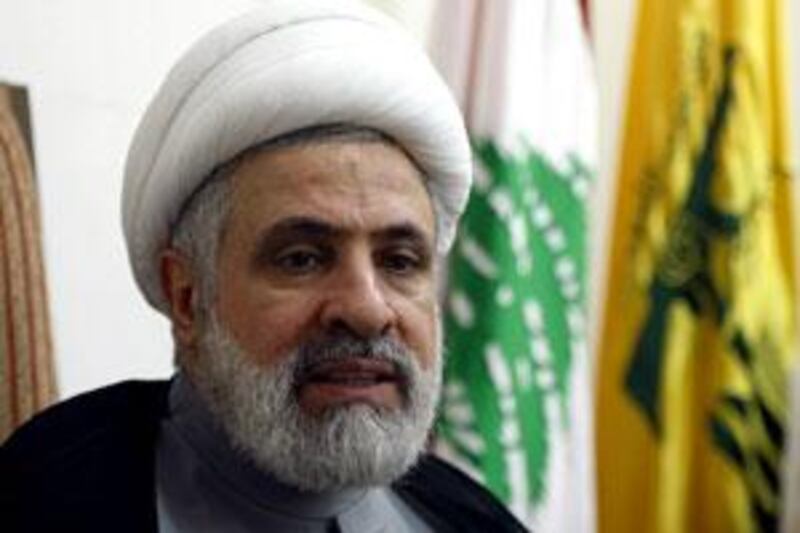BEIRUT // The unrest over allegations that Iranian authorities rigged this month's presidential election in favour of the incumbent, president Mahmoud Ahmadinejad, has been met with almost complete silence by Lebanese parties closely aligned with and supported by Iran's religious conservatives. Just as the Obama administration has been reluctant to position itself as supporting the disgruntled Iranian opposition, led by the presidential candidate Mir Hossain Mousavi, for fear of alienating the Iranian people and playing in to the hands of hardliners, Lebanon's Iranian allies in the militant group Hizbollah have been equally unwilling to comment on the events over the past two weeks in Iran.
"We cannot be seen as taking sides in Iranian disputes," said one Hizbollah official who asked not to be named. "We are loyal to the supreme leader but we consider the disputes to be an internal Iranian matter and hope that outside powers do not interfere with the process." The Hizbollah official did admit that the group sees the controversy as western agitation against President Ahmadinejad, but he stressed that Hizbollah had worked with Mr Mousavi in the past and considers him a supporter of their resistance movement.
Yesterday was the first time the group publicly stated its belief that western interests were involved in unrest in Iran "The extent of western and American involvement in Iran's internal affairs is now clear," the group's deputy leader, Sheikh Naim Qassem, said. "What is going on in Iran is not a simple protest against the results of the presidential election," he said. "There are riots and attacks in the streets that are orchestrated from the outside in a bid to destabilise the country's Islamic regime."
Hizbollah's supporters in Beirut agreed that the controversy, which has seen a number of anti-government demonstrations, appeared to be the work of foreign meddling. "It's obvious that Ahmadinejad won the elections, but still some people in Iran and outside refuse to believe it," said Abbas Ataya, 53, a taxi driver. He pointed out that the Hizbollah-led opposition in Lebanon also had some difficulty in believing they lost the parliamentary elections this month.
A Hizbollah spokesman refused to comment on the Iranian elections, but did admit that the group has remained on high alert as the controversy continues, instituting higher security precautions in the areas where the group essentially constitutes a state within a state. Heavily supported and funded, not just by the Iranian government, but through a system of networks controlled by Iran's conservative clerical establishment, Hizbollah considers the Iranian supreme leader Ayatollah Ali Khamenei to also be their top religious authority.
Ayatollah Khamenei has strongly supported President Ahmadinejad in the struggle against the protesters and much of the protest movement appears to not just be a challenge to the election but to the concept of Veliyat-e-Faqih, or rule by the clerics, which forms the foundation of both the Islamic republic of Iran, as well as Hizbollah. In a series of statements seen as a response to the perceived attack on Veliyat-e-Faqih in Iran, Hizbollah's general secretary, Hassan Nasrallah, warned political opponents in Lebanon not to insult or challenge the group's core beliefs, which are considered somewhat controversial even among religious Shiite authorities.
Mr Nasrallah said in a speech last week that "the subject of the Wilayat al Faqih and the Imamate is at the heart of our religious doctrine, and any offence to it is an offence to our religion". And in what appeared to be an attempt to address the Iranian strife over the rule of the clerical establishment, Mr Nasrallah added that internal controversies among the Shiite community on such matters should not be seen as an excuse to interfere in the group's affairs or ideology.
"[T]he lack of unanimous agreement among Shia on Wilayat al Faqih does not prevent it from being part of our doctrine," he said. "And so, in all politeness I tell you, say what you will in politics and stay away from offending our beliefs." That approach was echoed by many Lebanese, who just finished their own tough election battles, and appear to want little to do with the Iranian situation. "I think we should leave Iran alone," said university student Nisreen al Ahmad, 23.
"I'm sure they will know how to deal with their problems. Here in Beirut, we need to enjoy the summer." @Email:mprother@thenational.ae





